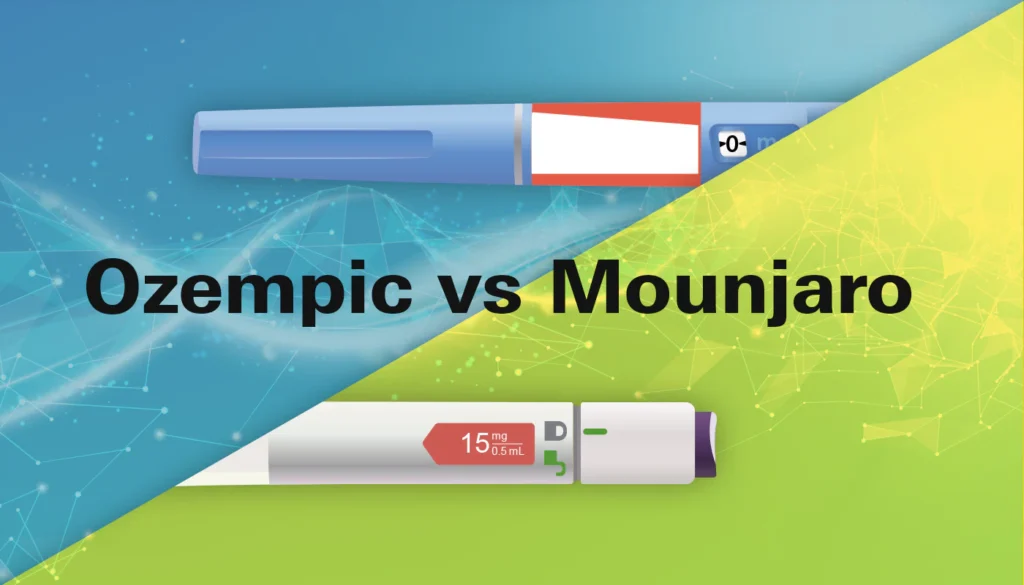How to Monitor Your Progress on Mounjaro vs Ozempic1
Table of Contents
Managing diabetes effectively is mounjaro vs ozempic crucial for maintaining a healthy lifestyle. With advances in medication, individuals have more options than ever before to control their blood sugar levels. Two prominent drugs in the diabetes treatment landscape are Mounjaro and Ozempic. Both are injectable medications designed to aid in mounjaro vs ozempic glucose control, but they differ in their mechanisms, benefits, and applications.
This article provides an in-depth comparison of mounjaro vs ozempic, offering insights into their uses, effectiveness, side effects, and how to choose the right treatment for your needs.
What Are Mounjaro and Ozempic?
Mounjaro (Tirzepatide)
Mounjaro is a newer entrant in diabetes management, approved by the FDA in 2022. It is a dual GIP and GLP-1 receptor agonist, making it unique in its mechanism of action. By activating these receptors, Mounjaro helps regulate blood sugar mounjaro vs ozempic levels and promotes weight loss in individuals with type 2 diabetes.
Ozempic (Semaglutide)
Ozempic is a well-established medication that falls under the class of GLP-1 receptor agonists. Approved by the FDA in 2017, it works by mimicking the effects of GLP-1, a hormone that regulates blood sugar and appetite. Ozempic has gained popularity in mounjaro vs ozempic for its dual role in managing type 2 diabetes and aiding in weight loss.
How Do They Work?
Mechanism of Action
- Mounjaro:
Mounjaro’s dual-action mechanism activates both glucose-dependent insulinotropic polypeptide (GIP) and glucagon-like peptide-1 (GLP-1) receptors. This dual stimulation enhances insulin secretion, slows gastric emptying and mounjaro vs ozempic reduces appetite, leading to better glucose control and significant weight loss. - Ozempic:
Ozempic solely targets the GLP-1 receptor, which stimulates insulin release in response to elevated blood sugar levels. It also reduces glucagon secretion, slows gastric emptying, and promotes satiety, helping manage both blood sugar and weight.
Key Differences:
- Mounjaro’s dual mechanism potentially offers greater efficacy in glucose and weight management.
- Ozempic focuses solely on the GLP-1 pathway, which is highly effective but may be less comprehensive than Mounjaro’s approach.
Effectiveness in Blood Sugar Management
Mounjaro:
Clinical trials have shown Mounjaro to be highly effective in lowering A1C levels (a key marker of long-term blood sugar control). On average, participants with mounjaro vs ozempic experienced an A1C reduction of up to 2.4% depending on the dosage.
Ozempic:
Ozempic also demonstrates significant efficacy, with studies reporting an A1C reduction of up to 1.8%. While slightly less potent than Mounjaro in this aspect, it remains a reliable option for many patients.
Verdict:
Both medications effectively lower blood sugar, but Mounjaro may have a slight edge in terms of A1C reduction.
Weight Loss Benefits
Weight loss is a critical component of managing type 2 diabetes, and both Mounjaro and Ozempic excel in this area.
- Mounjaro:
Clinical trials report average weight loss ranging from 12% to 25% of body weight, depending on dosage and treatment duration. - Ozempic:
Patients using Ozempic have reported average weight loss of 6% to 13% of body weight, with results varying by dosage.
Verdict:
Mounjaro offers more significant weight loss, making it a preferred choice for patients prioritizing this benefit.

Dosage and Administration
- Administered once weekly via subcutaneous injection.
- Dosages range from 2.5 mg to 15 mg, adjusted based on patient response.
Ozempic:
- Also a once-weekly subcutaneous injection.
- Dosages include 0.25 mg, 0.5 mg, 1 mg, and 2 mg, with gradual escalation to minimize side effects.
Both medications require proper training for self-administration and come in pre-filled pens for ease of use.
Side Effects and Safety
Mounjaro:
Common side effects include:
- Nausea
- Diarrhea
- Decreased appetite
- Injection site reactions
Rare but serious risks may include pancreatitis or thyroid tumors (in animal studies).
Ozempic:
Similar side effects to Mounjaro, including:
- Nausea
- Vomiting
- Constipation
- Potential risk of thyroid tumors
Both drugs carry a boxed warning for thyroid C-cell tumors, so they are not recommended for patients with a family history of medullary thyroid carcinoma.
Verdict:
Side effect profiles are comparable, though individual tolerance may vary. Always consult your healthcare provider to weigh the risks and benefits.
Cost and Insurance Coverage
Mounjaro:
As a newer medication, Mounjaro tends to be more expensive. Insurance coverage is improving, but out-of-pocket costs can range from $900 to $1,200 per month mounjaro vs ozempic without insurance.
Ozempic:
With more established insurance coverage, Ozempic is relatively more affordable. Costs without insurance range from $800 to $1,000 per month, depending on dosage and pharmacy.
Verdict:
Ozempic may be more accessible for patients concerned about cost, but Mounjaro’s expanding coverage could level the playing field over time.
Choosing Between Mounjaro and Ozempic
When to Choose Mounjaro:
- You’re looking for maximum A1C reduction.
- Significant weight loss is a primary goal.
- Your healthcare provider recommends trying a dual-action therapy.
When to Choose Ozempic:
- You want a proven, well-established medication.
- Your insurance provides better coverage for Ozempic.
- You prefer a treatment with a narrower mechanism of action.
Patient Experiences and Reviews
Mounjaro:
Patients often praise Mounjaro for its rapid weight mounjaro vs ozempic loss effects and improved energy levels. Some report mild nausea during the initial weeks, which typically subsides over time.
Ozempic:
Users highlight Ozempic’s consistent blood sugar control and manageable side effects. Its long-standing track record offers reassurance to many patients.
Conclusion: Mounjaro vs. Ozempic – Which is Right for You?
Both Mounjaro and Ozempic are exceptional medications mounjaro vs ozempic for managing type 2 diabetes and promoting weight loss. While Mounjaro may offer superior outcomes in terms of A1C reduction and weight loss, Ozempic remains a reliable, cost-effective mounjaro vs ozempic option for many patients.
Ultimately, the choice between Mounjaro vs. Ozempic should be made in consultation with your healthcare provider, who can tailor a treatment plan to your mounjaro vs ozempic unique needs and medical history. Regardless of your choice, both medications represent significant advancements in diabetes care, helping patients lead healthier, more balanced lives.



